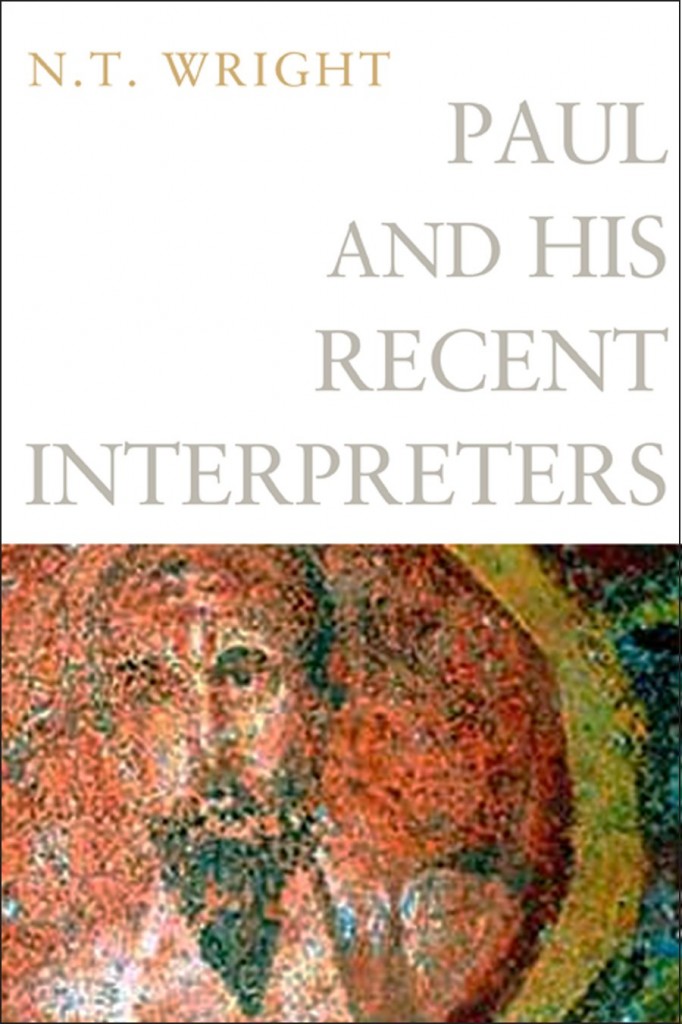The word Apocalyptic means different things to different folks. In the second major part of Tom’s review of recent scholarship on Paul, he focuses in on the ‘apocalyptic’ approach to Paul’s Gospel spawned by Kasemann and carried forward by J.C. Beker, L. Martyn and his disciples in the U.S. Tom is quite critical of this whole approach to Paul, and fundamentally the reason is because: 1) it rejects the notion of a continuous story that the Gentiles are grafted into, particularly rejecting the notion of covenantal continuity which is the basis of so much of Tom’s Reformed approach to Paul, and 2) it affirms that the incursion of the Kingdom and of the eschatological events of the death and resurrection of Jesus severed the connection with the past, and offered up a whole new creation, a new situation, a new covenant that should not be linked with the Mosaic one. There is a cosmic dimension to this whole approach, for example the apocalyptic triumph over cosmic evil, first in the res. and later completed when Christ returns is the main theme. Beker is following Kasemann’s ‘apocalyptic is the mother of Christian theology idea’ and his Romans commentary, and applying it more widely to Pauline thought. A. Schweitzer, and later Kasemann were swimming against the dominant tide which was anti-apocalyptic when it came to early Christian theology. Tom himself finds the term ‘apocalyptic’ very slippery when it is used to describe not a literary genre (i.e. dreams and visions from God and prophecy based on them) but a certain content of the Gospel. The following is his analysis of how apocalyptic language has been bandied about and misused in America….
“An example of the confusion can be seen in the two major movements,
within American biblical scholarship, in which ‘apocalyptic’ has played a
key role. The much-heralded ‘Jesus Seminar’, which met under the chairmanship
of the late Robert Funk, made the rejection of ‘apocalyptic’ one of
its basic criteria for distinguishing genuine Jesus-sayings from spurious
ones. Jesus himself, they decreed, was not an ‘apocalyptist’, because that
would have made him bombastic and judgmental, announcing the end of
the world and threatening sinners with hellfire – in other words, doing all
the things which American fundamentalists were supposed to do and which
the ‘Seminar’ rejected. Jesus, by contrast, belonged in the cooler, more savvy
atmosphere of ‘wisdom’, conveying by stories and clever sayings an alternative
way of life. Some members of the Seminar, to be sure, argued that
Jesus did use ‘apocalyptic’ language, but that this was to be taken metaphorically.
Others occasionally pointed out, with obvious examples like
the Wisdom of Solomon, the Qumran Community Rule, and Matthew’s
gospel, that the antithesis between ‘wisdom’ and ‘apocalyptic’ did not seem
to be found in the actual texts. But these views went unheeded. ‘Apocalyptic’
meant fundamentalism (the Seminar was born not long after the
Jonestown massacre), and Jesus was to be separated from it by a wide margin….
Here is the irony: in Martyn at least, as we shall see presently, one sometimes has the impression that the main thing to be avoided is the kind of fussy, who’s-in-who’s-out sort of
Christianity one finds in – popular American religion! Thus, at the risk of oversimplification, it might appear that the ‘Jesus Seminar’ disliked fundamentalism,
and so avoided ‘apocalyptic’, whereas Martyn and others also
dislike fundamentalism, and so have embraced ‘apocalyptic’.” (pp. 142-43).
As it turns out, Tom is more sympathetic to Beker’s use of apocalyptic language to understand Paul than Martyn and his disciples. For example, on p. 152 he quotes Beker approvingly as follows——
“He believes that Christ is the surprising answer to Judaism’s religious search, and thus he
never considered himself a ‘founder’ of a new religion. For Paul, the Hebrew scriptures climax in Christ as their eschatological confirmation . . . The ‘New Testament’ is . . . the
authoritative interpretation of the Scriptures in the light of the crucified Messiah, that is,
‘the gospel concerning his Son’ that God ‘promised beforehand through his prophets in
the holy scriptures’ (Rom. 1:2, 3)”.
Tom adds on his own the following— “The ‘imminent triumph
of God’ is the triumph of the divine faithfulness, the divine commitment
to put the whole creation right at last, expressed in the present
through the putting-right of those who believe, achieved through the divine
accomplishment of the ancient covenant promises. This way of expressing it
is, of course, my own, but I do not think it is very different from what Beker
was saying. Let us, by all means, put the ‘apocalyptic’ triumph of God in the
middle of the picture. Let us insist that this triumph is ‘defined by the death
and resurrection of Christ’, and that it ‘constitutes the basic coherence of
the Pauline gospel’, expressed contingently in relation to the varying needs
of the churches. But let us, like Beker, insist that this ‘apocalyptic’ theology
contains within itself, and does not displace, contradict, or render redundant,
those other features of Pauline thought (history, including salvation history,
‘justification’ and ‘participation’, and indeed sin, guilt, forgiveness
and atonement) which must be integrated in any full exegetical and theological
account of his letters. What Beker saw as coherent ought not lightly to
be dismissed as incoherent.” (p. 154).
What Tom wants to affirm that Martyn and others want to deny is that ‘the righteousness of God’in Romans and elsewhere refers to God’s faithfulness to previous covenant promises etc. The problem with that whole approach is: 1) once the covenant has been badly broken, God is under no obligation to keep his end of the bargain. Indeed 2) the normal way covenants worked was when they were broken the curse sanctions were enforced and then the covenant was at an end. Unless, I’m badly mistaken, when Paul talks about Christ taking the curse upon himself in his death on the cross, he is talking about Christ being the dead end of the old Mosaic covenant, the final act of that covenant being adminstered on Christ instead of on God’s sinning people. This is in part what Rom. 10.4 means. This being so, the discussion of God’s righteousness in Romans is not a reference to covenantal loyalty on God’s part, it is reference to God’s actual character. God, in any case had not promised the gentiles anything, had no pact with them, and Paul is mainly addressing Gentiles in Romans. And what he says immediately after announcing the theme of the righteousness of God is that this entail God’s wrath against sin, including sinning gentiles (see 1.18-32) with whom he had no deal. In short righteousness in Romans is about the character of God and the character he wants replicated in those who embrace his Son, Jew or Gentile. The term is not a code word for covenantal loyalty to a now defunct covenant. It can however, bring into play the paradigm of Abraham and the Abrahamic covenant and his gaining right standing with God, not on the basis of a previous covenant but on the basis of Abraham’s trust in God which is credited for right-standing or righteousness.













